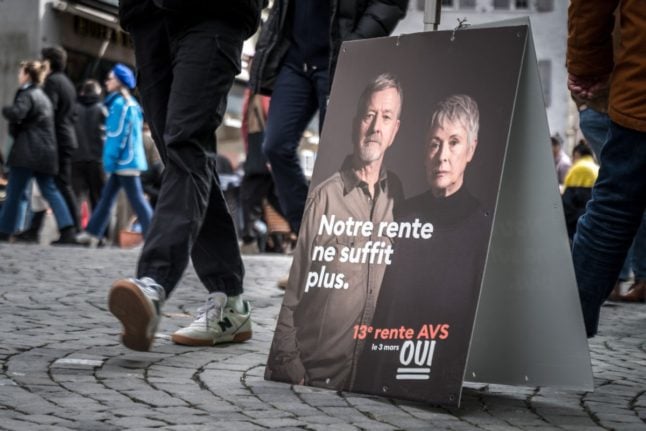The “Better living in retirement” proposal calls for a 13th monthly pension payment each year, similar to the “13th month” salary many employees receive in Switzerland and other European countries.
Monthly social security payments in Switzerland can rise to 2,450 Swiss francs ($2,780) for individuals and 3,675 francs for married couples.
READ ALSO: What is Switzerland’s 13th-month pension plan and why are they voting on it?
The payments do not go far in a country consistently ranked among the most expensive in the world.
Rent for a typical two-bedroom apartment in Swiss cities is at least 3,000 francs, and a coffee costs upwards of five francs.
“There is a purchasing power crisis,” said Pierre-Yves Maillard, head of the Swiss Trade Union Federation (SGB) and part of the “yes” campaign.
“Retirees are seeing their living standards erode,” he told AFP last week.
“The cost of living just keeps soaring,” agreed Jakob Hauri, a retiree quoted by the campaign.
People power
Left-leaning parties supported the initiative, which was fiercely fought by right-wing and centrist parties, as well as the Swiss government and parliament.
The government warned the proposed hike would cost more than four billion Swiss francs a year, which would require tax increases and could threaten the financial stability of the social security system.
It also said there would be limited social benefit from the proposed change, which would hand additional payments to all pensioners, regardless of their financial situation.
“If the initiative passes, a lot of retirees will receive a 13th social security payment even though they don’t really need it,” the government warned.
But the Swiss Trade Union Federation (SGB) said Sunday’s vote results “clearly show that the government, a majority of the parliament and employers have for too long ignored the pension problem”.
Its chief, Pierre-Yves Maillard, told public broadcaster RTS on Sunday that the win was “a wonderful message to all those who have worked hard all of their lives”.
It is proof, he said, that “it is the people who have the power in Switzerland”.
Retirement age unchanged
A second issue on the ballot Sunday seeking to raise the retirement age was soundly rejected.
A full 74.72 percent of voters turned down the proposal by the youth branch of the right-wing Liberal Party to gradually raise the retirement age from 65 to 66 over the next decade, a moved aimed at ensuring full financing of the pension system.
A majority of voters in every Swiss canton rejected the proposal, which came less than two years after voters narrowly opted to raise the retirement age for women from 64 to 65, to match the retirement age for men.
Voter participation is generally low in Switzerland’s popular votes, which are held every few months, and rarely inches above 50 percent.
But Sunday’s issues sparked heated debate and participation reached more than 58 percent.



 Please whitelist us to continue reading.
Please whitelist us to continue reading.
Overall the Swiss economy will benefit from pensioners eventual increase in spending and some reduction of other social support measures.